The Supreme Court on Tuesday said Parliament undisputedly has the legislative power over issues raised in pleas seeking legal sanction for same-sex marriage and pondered over the 'interstices' left open for it to exercise its power and till what extent.
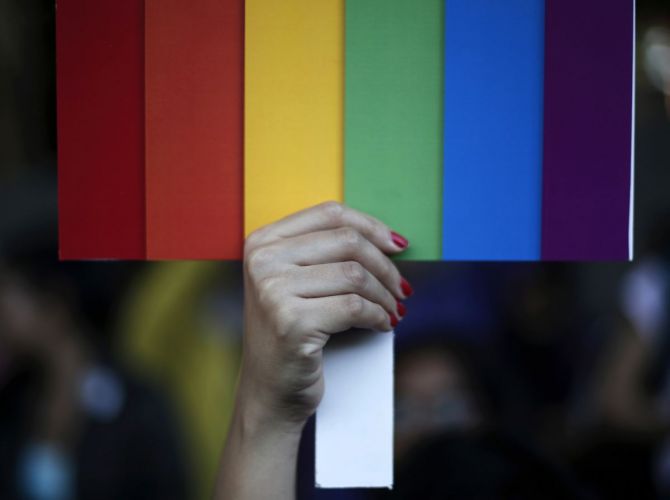
A five-judge Constitution bench headed by Chief Justice of India D Y Chandrachud was faced with several consequential legal questions, such as adoption, succession, intestacy and laws governing pension and gratuity where a once legally-acknowledged spouse is the beneficiary, if it decides to legalise same-sex marriage.
The bench observed that if same-sex marriage is allowed, then the judicial interpretation, keeping in mind the consequential aspects, will not remain confined to the Special Marriage Act, 1954 and personal laws will also come into play.
'Now, the question which we really therefore have to pose is, if this is a power which is conferred specifically on Parliament, where does the court really exercise its jurisdiction. Which are those interstices which are left open for the court to exercise its powers,' the bench, also comprising Justices S K Kaul, S R Bhat, Hima Kohli and P S Narasimha, said.
Observing that there is no denying that there is a link between the 1954 Act and the personal laws of various religions, the bench said, 'Therefore, you cannot confine to the Special Marriage Act and it has to go beyond it.'
On the fourth day of the hearing, senior advocate Saurabh Kirpal, who appeared in the court on behalf of the petitioners, vehemently pleaded for legal validation of same-sex marriage, saying seven per cent of the country's GDP will be affected if the LGBTQIA++ (lesbian, gay, bisexual, transgender, queer, questioning, intersex, pansexual, two-spirit, asexual and ally) are denied this fundamental right.
He said gay and lesbian people are also like heterosexuals and if their marriage is not registered here, they will leave for another country for better rights, and contended that it will be a 'gay brain-drain'.
"There cannot be a situation where the court will say that it cannot give everything so it will give nothing," Kirpal said.
Referring to the possible impact after validating same-sex marriage, the bench quipped, "Aren't we taking too many legislative steps here? You are actually bringing in a contemporary (issue) when the intention was something else that time when the Special Marriage Act was enacted."
It said the absence of a broader legislation covering a wider class of persons like the LGBTQIA community is not a ground to strike down that law.
The bench referred to section 21A of the Special Marriage Act, which provides certain reliefs to Hindus, Buddhists, Sikhs or Jains in property and other related issues if they solemnise their marriages under the law, and said it is very specific and if the court has to make some provisions of reading it, it has to be consistent with other provisions.
The bench told senior advocate Menaka Guruswamy, who represented the petitioners, that suppose the top court substitutes the terms man and woman with 'spouse' or 'person' in Section 4 of the Act, which deals with conditions relating to solemnisation of special marriages, the question will be can it 'stop at that today'.
"Dr Guruswamy, the point really is that the fact that the canvas which is covered by these petitions also falls or does fall within the domain of Parliament is undisputed," the CJI said.
'You cannot dispute the fact that Parliament has the legislative power over the canvas which is covered by these petitions, which is Entry 5 of the concurrent list,' the bench said.
Guruswamy contended that the Centre cannot come to the court and argue that this a matter for Parliament as when the fundamental rights of an individual are violated, he or she has the right to approach the court.
Referring to the 1997 Vishaka verdict that laid down the guidelines to handle cases of sexual harassment at workplace, the CJI said it was a classic example where the court laid down the framework pending the legislature coming up with a law in this regard.
'The test really is this -- how far does the court go,' the bench said.
Referring to the submissions advanced by the petitioners, it said there is no doubt that adoption, succession and intestacy are matters governed by personal laws even today.
"My lords have been that north star, not just for LGBTQ rights, my lords have been the north star in many facets of fundamental rights pre the legislature walking the talk," Guruswamy said.
She said the petitioners are not asking for anything special and are only asking for a workable interpretation of the Special Marriage Act.
"We are also part of 'we the people' and we are citizens of this country. The basic structure (of the Constitution) also belongs to us," Guruswamy said.
The bench said the petitioners are right in asserting that marriage itself is a bouquet of rights and though they have identified three aspects -- gratuity, provident fund and pension -- 'actually, it does not stop at that at all'.
It gave an example about the entitlement of one spouse upon the death of the other in a motor accident.
'How does the court today, if we have to go into this, avoid getting into other issues which are necessarily intrinsically interlinked to what you are arguing?' it asked.
Guruswamy argued that a declaration on recognising same-sex marriage would be the first step.
'How many times are we to play the follow-up? That is what worries us. Because if we are not to go into it just because it suits certain cases and that is the thorny issue ... our job is to look at the workability, not only of what you are showing us illustratively...,' the bench said.
"May I bring to your attention section 21A, which is very specific, and is within the Special Marriage Act. Because if we have to make some provision of reading in under that Act, we have to make it consistent with the other provisions," Justice Bhat said, adding, "The remit of this is very clear that you will revert to personal laws."
The bench also said there is no denying that there is a link between the Special Marriage Act and personal laws.
During the day's hearing, the bench heard the submissions advanced by several senior advocates, including Geeta Luthra, Anand Grover, Jayna Kothari, Guruswamy and Kirpal, who appeared for the petitioners.
The hearing, which would continue on Wednesday, witnessed two judges -- Justices Kaul and Bhat -- joining the proceedings virtually.
While hearing the arguments on April 20, the apex court had said it may be redefining the 'evolving notion of marriage' as the next step after decriminalising consensual homosexual relationship will imply that same-sex people could live in a stable marriage-like relationship.
It had pondered over whether the relationship between a man and a woman is so fundamental to the Special Marriage Act that substituting them with the term 'spouses' will amount to redoing the legislation.
Elaborately referring to its 2018 judgment that decriminalised consensual gay sex, the top court had said it led to a situation where two consenting homosexual adults can live in a marriage-like relationship and the next step could be to validate their relationship as marriage.
During the hearing on April 19, the apex court had said the state cannot discriminate against an individual on the basis of sexual characteristics over which the person has no control.
It had asserted that the Centre has no data to back up its claim that the concept of same-sex marriage is 'elitist' or 'urban'.
On April 18, the bench had made it clear that it will not go into personal laws governing marriages while deciding these pleas and said the very notion of a man and a woman, as referred to in the Special Marriage Act, is not 'an absolute based on genitals'.
The Centre, in one of its affidavits filed in the apex court, termed the petitions a reflection of an 'urban elitist' view for the purpose of social acceptance and said the recognition of a marriage is essentially a legislative function that the courts should refrain from adjudicating.



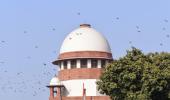
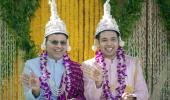


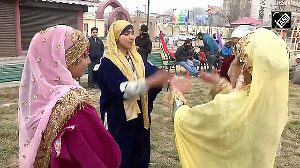

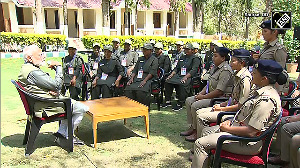
 © 2025
© 2025